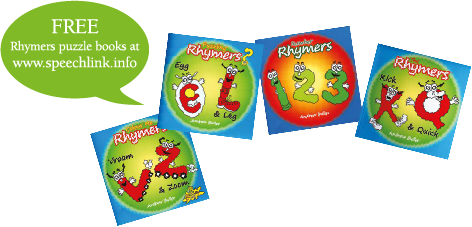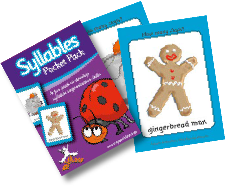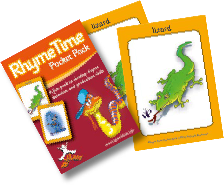Ruth Merritt, SaLT, considers the importance of rhyme for speech, language and early literacy development.
In a classroom the other day listening to a phonics session, it struck me how really important rhyming can be. How a child learns that one spelling has the same sound as another spelling is based on rhyme. If children can understand that, it becomes the hook on which they can hang the seemingly random spellings they encounter in English.
By making children aware that words share segments of sounds (e.g. the -ay segment in the words hay, day, lay, say) through rhyming, this in turn can help them to understand that such words often have the same spellings (Goswami, 1988). Similarly, these rhymes can also help children learn that words like hay and sleigh rhyme, but have different spellings.
Learning to read and enjoying the act of reading in the early days with children isn’t always easy! We have to do everything we can to capture young children’s imagination and interest in the idea of books, and the idea of reading stories. There are many ways we can do this, and one important way is with the use of rhyming. Children usually love rhyme, rhythm and repetition! They tend to learn rhymes more quickly than other things. You only have to think of how a very young child can be prompted to complete the missing rhyming word with nursery rhymes such as – “humpty dumpty sat on the wall – humpty dumpty had a great ……?”
So it’s no surprise really that rhyming plays such an important part with children and literacy development. Research is mixed on the real value of rhyming in terms of its effect on literacy and spelling, as they have discovered a clearer impact from children’s ability to use segmentation of words into syllables. However, there is also plenty of clear evidence to show that developing rhyming skills does help with literacy development. This is especially so in their second year of reading, where its impact is visible on spelling skills. Experts in literacy and child development in Wales have discovered that, if a child knows eight nursery rhymes by heart by the time they are four years old, they are usually among the best readers and spellers in their class by the time they are in Year 3.
There are so many good reasons to use rhymes in your everyday teaching: children can gain practice in pitch and volume as well as in language rhythm and rhymes often introduce children to new vocabulary, thereby expanding their own knowledge of words in a natural and fun way.
Most of all, making use of rhyming in your teaching can be fun and will help develop in children a love of language, books, singing and rhyme. This will go on to form a solid foundation for their literacy and language development.
The Rhymer books by Andrew Buller

Andrew Buller, author, illustrator and designer, has put together a new range of simple and colourful Rhymer books available from Amazon for children from Foundation to Key Stage 1. There are 8 different types of book ranging from colouring games, short stories and puzzles, all based around some lovely alphabet characters. The characters all have their own names and personalities with each book focussing on a rhyming pair. The stories all encourage the development of rhyme, with each of the rhyming pairs have their own full-colour story book, a colouring and story book combined. Some have a companion puzzle book too. Andrew uses some nice alliteration and varied vocabulary within the story lines which will appeal to many children of varying ages.
More details about all The Rhymers’ books can be found at www.meettherhymers.com.
Speech Link Pocket Packs are available to buy at our online shop.

These are pocket sized packs of beautifully designed and colourful pictures which can be played in a number of ways. With the Rhyme Time pack, children are encouraged to detect and produce rhyming words – both these aspects are seen as key phonological processing skills. With Rhyming Pairs, children must find a rhyming partner to the word they pick and with Rhyme Time, children are encouraged to think of others words that rhyme with their word.
The Syllables pack looks at another vital aspect of both speech and literacy, and children can play three different games helping them break down words into syllables and develop their awareness of syllable boundaries.

References
- Muter, V., Hulme, C., Snowling, M. & Taylor, S. (1997) Phonemes, Rimes, Vocabulary, and Grammatical Skills as Foundations of Early Reading Development:
- Evidence from a Longitudinal Study. Developmental Psychology, Vol 40(5), Sep 2004, 665-681. Goswami,U (1988) ‘Children’s use of analogy in learning to spell’.
- British Journal of Developmental Psychology, 6, 21-34.
Please login to view this content
Login